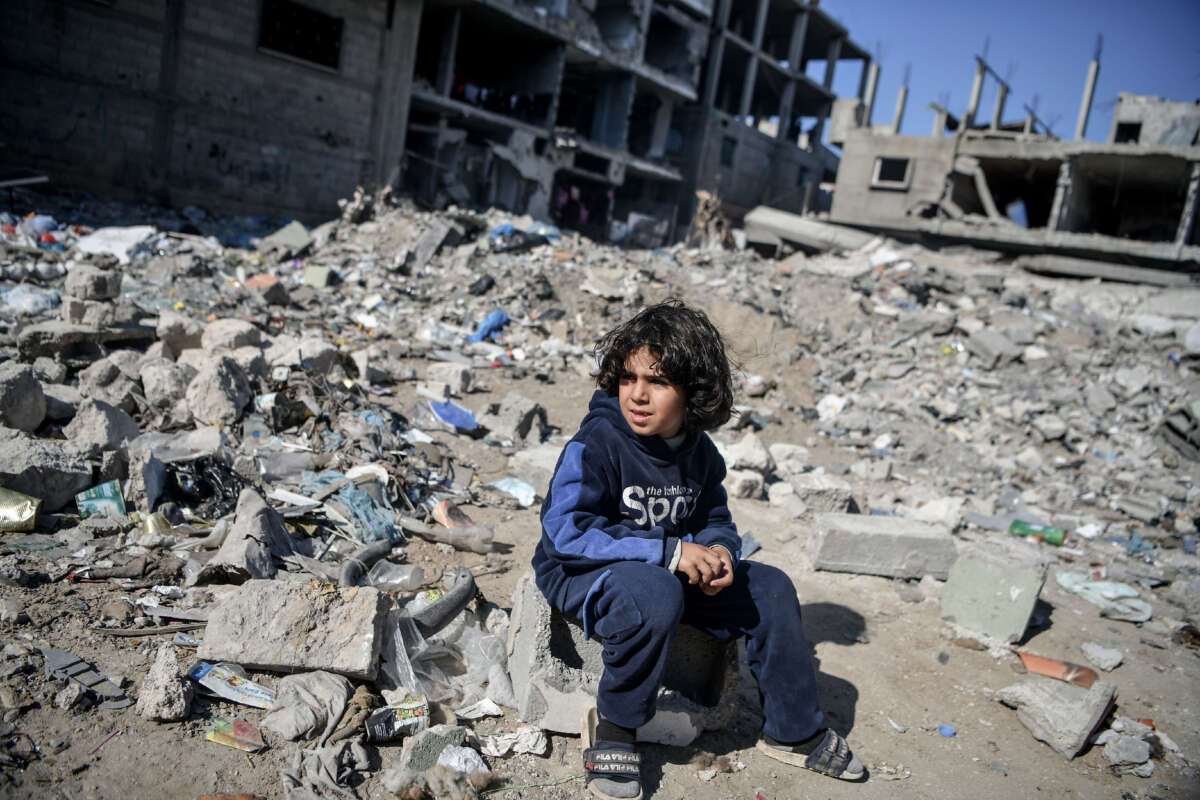Honest, paywall-free news is rare. Please support our boldly independent journalism with a donation of any size.
In a devastating address in front of the UN Security Council on Thursday, the head of Médecins Sans Frontières (MSF), also known as Doctors Without Borders, denounced the U.S. and the council for “complicity” in the “unimaginable suffering” that Israel is inflicting in Gaza, describing the horrifying conditions that aid workers have endured in the health system that Israeli forces have totally destroyed.
MSF Secretary General Christopher Lockyear specifically called out the U.S. for its veto of the ceasefire resolution that came before the security council earlier this week, highlighting the killing of two of the group’s workers this week, the terror of impending attacks from Israeli forces and the political consequences of continuing to endorse the genocidal assault.
“The laws and the principles we collectively depend on to enable humanitarian assistance are now eroded to the point of becoming meaningless,” Lockyear said. “Madam President, the humanitarian response in Gaza today is an illusion — a convenient illusion that perpetuates a narrative that this war is being waged in line with international laws.”
These incursions by Israeli forces fly in the face of international law, he said, and health care workers in the field are operating in conditions so destitute that they are resorting to extreme circumstances to provide basic care, like forgoing anesthesia to amputate children injured in shellings or reusing gauze to stem bleeding between patients.
“Medical teams have added a new acronym to their vocabulary. WCNSF: wounded child, no surviving family,” he said. “Children who survive this war will not only bear the visible wounds of traumatic injuries but the invisible ones, too — those of repeated displacement, constant fear and witnessing family members literally dismembered before their eyes. These psychological injuries have led children as young as five to tell us they would prefer to die.”
Lockyear went on to call out the U.S. directly and noted that the group is afraid that their workers will be targeted by Israeli forces due to his testimony.
“We are appalled by the willingness of the United States to use its powers as a permanent Council member to obstruct efforts to adopt the most evident of resolutions: one demanding an immediate and sustained ceasefire,” Lockyear said.
Though the U.S. has presented its own supposed ceasefire resolution — one that only calls for a temporary ceasefire “as soon as practicable” — Lockyear says that the idea that the U.S. resolution calls for a ceasefire whatsoever is “misleading at best.”
“The people of Gaza need a ceasefire not when ‘practicable,’ but now. They need a sustained ceasefire, not a ‘temporary period of calm.’ Anything short of this is gross negligence. The protection of civilians in Gaza cannot be contingent on resolutions from this Council which instrumentalize humanitarianism to blur political objectives,” he said. “This is not just political inaction — it has become political complicity.”
Doctors and health care workers have long been sounding the alarm about the urgent need for a ceasefire in Gaza and Palestinian liberation, highlighting the massive amount of attacks on health care workers alone. As of this month, health officials have said that Israeli forces have killed 340 health care workers and arrested 99 others, while the UN has recorded 600 attacks on health facilities as of January.
Health care workers who have served in hospitals in Gaza and survived have described unimaginable conditions.
Virginia plastic and reconstructive surgeon Irfan Galaria recently volunteered in Rafah for 10 days. In The Los Angeles Times, he detailed the relentless bombing and drone sounds, the hospital corridors being turned into makeshift camps and the workers operating on and treating people while mourning lost loved ones. He described having to use rudimentary tools like a Gigli saw — “a Civil war-era tool, essentially a segment of barbed wire” — to perform amputations that would have been avoidable if the staff had access to standard equipment.
“I stopped keeping track of how many new orphans I had operated on,” Galaria wrote. “On one occasion, a handful of children, all about ages 5 to 8, were carried to the emergency room by their parents. All had single sniper shots to the head. These families were returning to their homes in Khan Yunis, about 2.5 miles away from the hospital, after Israeli tanks had withdrawn. But the snipers apparently stayed behind. None of these children survived.”
Press freedom is under attack
As Trump cracks down on political speech, independent media is increasingly necessary.
Truthout produces reporting you won’t see in the mainstream: journalism from the frontlines of global conflict, interviews with grassroots movement leaders, high-quality legal analysis and more.
Our work is possible thanks to reader support. Help Truthout catalyze change and social justice — make a tax-deductible monthly or one-time donation today.
